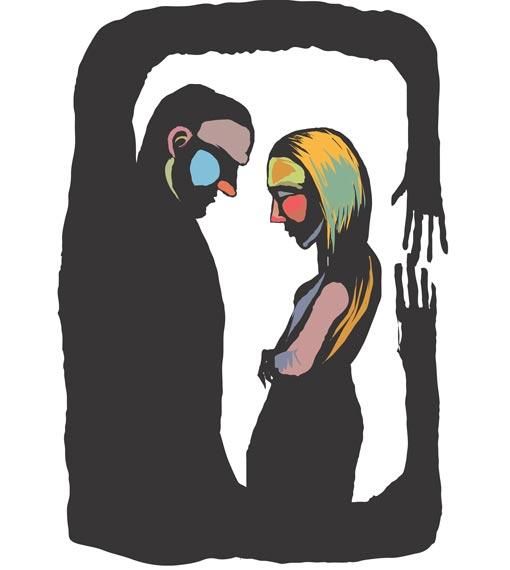All countries in the world have announced their support to equal rights for women. Yet, on a daily basis, various forms of discrimination and violence against females take place around the globe - behind high walls, closed doors, as well as in the public domain.
In patriarchal societies, as well as liberal ones, millions of women are forced to deal with different forms of discrimination and abuses at their work places and in their homes.
Sometimes, men install glass ceilings to separate women, which prevent them from moving up in their careers. Sometimes, it is manifested through salaries with women being paid less than men. At other times, it takes the form of physical or psychological abuse. Discriminatory laws and social norms, which give preference to men in different fields, also reduce women to the status of a "second class citizen".
Amazingly, many studies have shown that women who are subjected to violence and abuse are from all segments of society, including those from well-educated and well-off social classes. Yet, they don't speak about it because of shame, fear or out of concern that it would negatively affect their social status.
Societies and women alike share the blame for the situation by accepting the abuse and, in some cases, justifying it.
On the other hand, women activists say that many females, regardless of their education, feel "insulted" when activists speak to them about the need to end the abuse they are being subjected to.
In reference to women who defend the actions of their spouses, Mariam Ekeremawi, Director Jerusalem Centre for Women, says "Some women find reasons for their males' behaviour. Husbands in many of these cases are unemployed, or stress-hit or oppressed socially or politically."
No boundaries
Studies also show that discrimination against women knows no boundaries and limits. It exists almost everywhere in the world.
While Sweden, Norway, and Finland are the top three countries for women to live in, interestingly, only Germany - from the G-7 countries (Canada, US, UK, Japan, Italy, France) - figures in the top 10 list in the global gender gap index for the year 2007. The index examines the areas of economic participation, education, political empowerment, health and survival of women.
"Men don't think of women as equal to them," Ekeremawi told Gulf News. "They put women in a second class (and treat them) as second class citizens".
There is a widespread consensus over the importance of "women to have full equality of rights", in the world, concluded an international poll conducted by WorldPublicOpinion.Org. Most of those surveyed in 16 countries, described full equality as "very important".
Another poll, which was also conducted by WorldPublicOpinion.Org, concluded that divorced women and widows are treated worse than other women. Among the countries surveyed were the occupied Palestinian territories and Egypt.
"Widows and divorced women, as well as women whose husbands are in prison, do suffer because they became single parents, and society becomes strict on women in these circumstances," Ekeremawi said.
"They come under the microscope when they take the role of the family's breadwinner," women activist Sama Aweeda, Director of Jerusalem-based Centre for Women Studies said.
However, women in general face discrimination, but they start feeling it when it affects their lives.
"Women in these categories feel the discrimination because they start carrying out responsibilities that they were not prepared for by the society," Aweeda said. She believes discrimination hits all women in general.
Meanwhile, the results of the poll on the importance of equality raised many eyebrows and seemed ironic, because it shows the gap between reality and theory.
Usually, Aweeda told Gulf News, "surveys reflect the theoretical point of view and not the factual one."
Today, over 185 countries, over 90 per cent of the members of the UN, are party to the United Nations Convention on the Elimination of All Forms of Discrimination Against Women (CEDAW).
Convention
The Convention, which was established in 1979 by the the UN General Assembly, is considered as the "international bill of rights for women".
It consists of a preamble and 30 articles, and defines what constitutes discrimination against women and sets up an agenda for national action to end such discrimination.
"It is a legally-binding arrangement," said Naela Gabr, vice-chairperson of the UN committee on CEDAW, which is an experts' body established in 1982 and comprises 23 experts on women's issues from around the world.
Gabr, who is also an assistant to the Egyptian foreign minister, told Gulf News that recent figures show "real progress" for women's participation in political life, decision-making positions, education and health.
The committee's mandate is to monitor the progress made by women in their respective states. The experts' committee also oversee the implementation of national measures taken to uplift women. It can also make recommendation on any issue that affects women and to which the committee believes the state's representative should pay more attention.
Commenting on the wish of a large majority that their governments and the United Nations should take an active part in preventing discrimination against women, Gabr believes that governments alone cannot do much.
"Sometimes, the government wants to do something (a change in favour of women), but the parliament isn't ready, or the society isn't ready (for that change)." So it is rejected.
In some places in the world, campaigns are launched, NGOs take up the cause and different groups lobby for change.
Usually, social changes take a long time, and "it all depends on education and society", concluded Gabr.
There is a widespread consensus over the importance of 'women to have full equality of rights', in the world, concluded an international poll conducted by WorldPublicOpinion.Org. Most of those surveyed in 16 countries, described full of equality as 'very important'.











